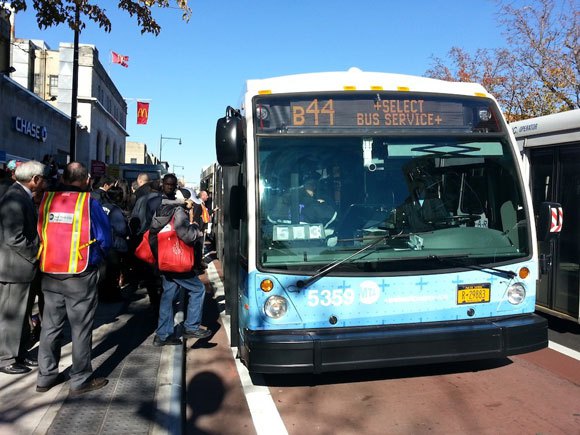To turn around NYC's sluggish surface transit, the MTA will have to switch to a citywide proof-of-payment fare system on buses. By eliminating on-board fare collection where every passenger pays one by one, proof-of-payment speeds up the boarding process and total travel time. Transit advocates have been urging the MTA to commit to this best practice when the agency moves beyond the MetroCard and adopts a new fare medium in the next few years.
One question that arises with proof-of-payment is how to handle fare enforcement. This is especially fraught in New York, where the MTA says it's concerned about fare evasion under a hypothetical proof-of-payment system, while pressure is mounting on law enforcement to scale back arrests for not paying the fare.
As with other aspects of fare collection, New York should look to cities that have refined their proof-of-payment systems for guidance on how to handle enforcement.
As things stand, NYPD's fare evasion arrests send tens of thousands of people -- disproportionately people of color -- through the criminal courts each year. Police arrest every person who doesn't carry valid ID or who has a court warrant. The court warrants are typically not for serious crimes, but for petty ones like having an outstanding fine. It's an excessively punitive process.
Two legislative efforts are underway to reduce the burden of prosecution and deter NYPD from over-policing fare evasion. City Council members Ydanis Rodriguez and Rory Lancman have introduced a bill that would require NYPD to regularly report fare evasion arrest data to the MTA, including a racial breakdown to monitor bias. In Albany, State Senator Jesse Hamilton and Assembly Member Tremaine Wright intend to introduce a bill to decriminalize fare evasion.
There is also some movement at the prosecutor level. Manhattan District Attorney Cy Vance announced two months ago that he would stop prosecuting fare evasion for first-time offenders, and Brooklyn District Attorney Eric Gonzalez followed suit. However, Vance's office says he only intends to end prosecutions for turnstile jumping. Passengers caught without a ticket on Select Bus Service would still be susceptible to criminal charges.
The notion that criminal penalties would still apply to SBS fare enforcement is troubling. SBS routes are the only MTA bus routes that use proof-of-payment now. A transition to citywide proof-of-payment would deliver big performance improvements for bus riders, but a situation where riding the bus still exposes transit riders to the threat of criminal prosecutions would be a perverse outcome. That's not how it works in cities with proof-of-payment that has been well thought-out.
Cities in the German-speaking world have long track records with proof-of-payment systems and provide some good models for fare enforcement reform.
One reason fare evasion remains uncommon in these cities, even with proof-of-payment, is that the fare structure encourages monthly passes. In Berlin, a four-ride ticket is €9 and a monthly pass is €81. A monthly pass that costs just 36 times as much as a single ride is a relative bargain. While Berlin has a subculture of people who ride without a ticket (known as Schwarzfahren), the fare evasion rate of 3 to 5 percent is not high by American standards.
In Switzerland, the ratio is even lower. A single trip in Basel costs 3.80 Swiss francs, while a regional monthly pass costs 105, or about 28 times as much.
In New York, however, a 30-day MetroCard costs 44 times as much as a single fare. There are reasons of fairness for the higher ratio, since affluent people will tend to opt for the higher upfront cost of a monthly pass, but it also creates some perverse incentives. If a pay-per-ride MetroCard runs out and a train or bus is coming, for instance, the passenger has an incentive to hop the turnstile or board Select Bus Service without paying.
Other differences involve policing, not fare policy. Germany avoids problems of excessive force and police militarization by not treating every issue as a grave criminal matter. It treats fare dodging as a civil infraction rather than as a criminal offense. While German transit agencies still want to minimize the revenue hit from fare dodging, there is no attempt to use fare inspections as a "broken windows" program.
In Berlin, the fare inspectors are civilians who work on consignment, so they have an incentive to check the routes with the most fare evasion. Inspections are frequent, but the fines are low, just €60.
In New York, meanwhile, NYPD still treats fare enforcement as a kind of dragnet to catch more serious violations like weapons possession. Thousands of people face criminal penalties for the sake of catching a few people with guns. Whatever the merits of that approach might have been in the early 1990s, it is not useful for the situation in New York today. The crime rate is low, and transit is overcrowded rather than abandoned.
Making all fare evasion a civil violation and removing NYPD from fare inspections would be fairer to communities that are currently overpoliced, and make people of color and immigrants more at ease on the transit system. There are good models for how to do so in the countries that have perfected proof-of-payment enforcement -- and even in some American cities as well. New York should learn from these examples.






